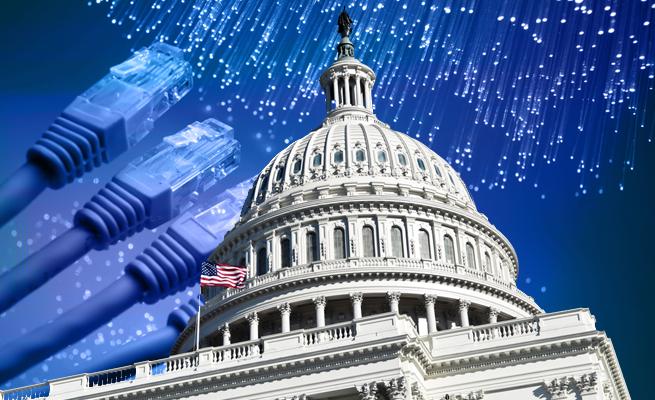
A Republican lawmaker has introduced a bill in Congress that seeks to prohibit the FCC from using its “nuclear option” to reclassify ISPs as a public utility. Under Title II of the Communications Act, the agency can put broadband under “common carrier” rules, which would allow for stricter regulation of the industry.
(For more info about Net neutrality and this entire situation, read our Net neutrality guide.)
This possibility has long been opposed by Republicans, and the new legislation aims to strip the FCC of authority in the matter. “In light of the FCC initiating yet another attempt to regulate the Internet, upending long-standing precedent and imposing monopoly-era telephone rules and obligations on the 21st Century broadband marketplace, Congress must take action to put an end to this misguided regulatory proposal,” Rep. Bob Latta (R-Oh), the bill’s author, said in a press release.
“At a time when the Internet economy is thriving and driving robust productivity and economic growth, it is reckless to suggest, let alone adopt, policies that threaten its success. Reclassification would heap 80 years of regulatory baggage on broadband providers, restricting their flexibility to innovate and placing them at the mercy of a government agency.”
Latta’s rhetoric is in line with his party’s stand. Republicans in the Senate earlier condemned reclassification, saying that it would impede new technologies and threaten investment in broadband infrastructure.
The bill has received applause from the cable and telecommunications industry. Bob Seiffert, the president of the Telecommunications Industry Association, said that he supports a “lighter touch” type of regulation. “As the courts have already ruled, the FCC has the existing authority, using a lighter touch approach, to protect consumers from possible abuses. Heavy handed, utility-like regulation should have no role for the Internet, and TIA supports efforts, such as the Latta proposal, which make that clear,” he said in a press release.
The National Cable & Telecommunications Association echoed Seiffer’s sentiments, saying: “Since the late 1990’s, policymakers and regulators have established a bipartisan consensus that a light regulatory touch provides the best path for ensuring that the Internet will become an engine of economic growth and social prosperity. We support the efforts of Vice Chairman Latta to codify current policy and to ensure that the Internet continues to grow and remains open and free from the burdens of outdated, public utility regulation.”
Net neutrality advocates disagree, and many have called on the FCC to reclassify broadband services. One of the most prominent proponents of the move is Mozilla, which recently outlined Net neutrality proposals in a blog post.
“Categorizing remote delivery services as telecommunications services is consistent with the guidelines set by both Congress and the DC Circuit Court of Appeals, and would give the FCC ample ability to adopt and enforce meaningful net neutrality,” the company said. “With clear authority and effective rules, ISPs would be prevented from blocking or discriminating against any edge provider, whether on a wireline or wireless network.”
The bill has a chance in the Republican-controlled Congress, which has a history of opposing Net neutrality legislation. However, it is less likely that it would be approved in the Senate. If the bill gets nixed, its provisions may resurface in a new proposal. Texas Sen. Ted Cruz had earlier circulated a draft bill that seeks to strip the FCC of authority over the Internet.


